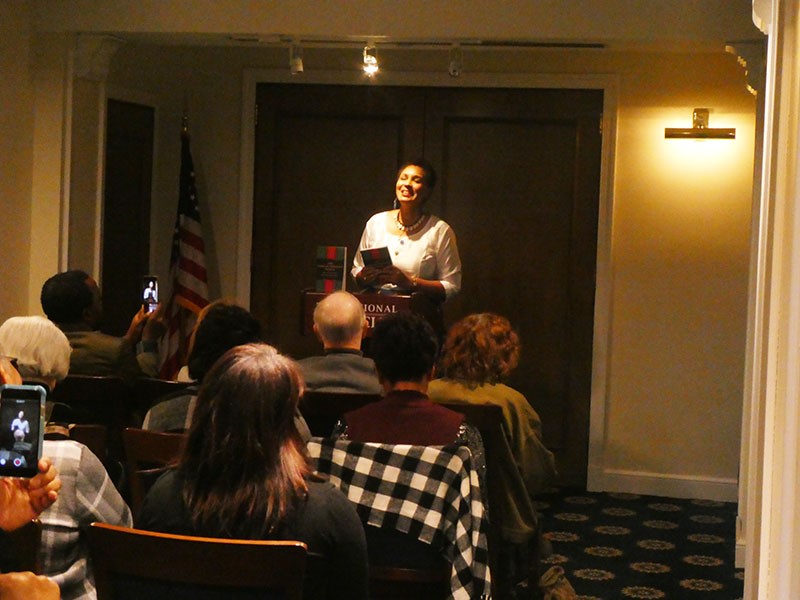Member’s book explores life-affirming history of African American woman

Gloria-Browne Marshall talks about her book, "The African American Woman, 400 Years of Perseverance," at the National Press Club Feb. 13. Photo: Joe Luchok
Gloria Browne-Marshall, professor of constitutional law at John Jay College, told a National Press Club Member Book Talk on Feb. 13 that she is “evidence of a miracle. We have all been through a great deal in 400 years.”
Browne-Marshall, a Club member who has been a civil-rights attorney for the southern Poverty Law Center in Philadelphia, and is an author of several books and playwright, recently published a collection of essay, "The African American Woman, 400 Years of Perseverance." The book commemorates the 400th anniversary of African people arriving in the Colony of Virginia in 1619.
With vigor and humor, pride and knowing, Browne-Marshall said, "I am Her.”
The book articulates the tenacity, perseverance, resistance and spirituality of black women who faced seemingly insurmountable odds as they fought for voting rights, civil liberties, housing, political participation and justice in U.S. courts while confronting sexism, imprisonment, and re-emerging patterns of racism.
Browne-Marshall venerated Black women reading from her poem “Enjoying the Darkness,” then offered a fascinating account, based on true events, about Nzingha: Warrior Queen, daughter of the king of what is now the Angola region of Africa. Trained as a warrior and diplomat, shrewd and fearless, she negotiated a peace treaty with the governor of Portugal after he laid clam to the region and her people. When the treaty was broken, she led thousands of men in guerilla warfare until her death in 1663, destroying Portuguese ships as part of her victories against the enslavers.
In acknowledging Queen Nzingha as part of their heritage, the author followed various African American women through history in their battle for human rights.
As one example, she said that in the 1600’s, when Mary and Anthony Johnson met the Virginia House of Burgesses requirement to vote by owning land, laws were changed. They were deemed aliens, and expelled from the Virginia colony.
And at the first women’s rights convention in Seneca Falls, New York, 1848, no black women activists were invited, and only one black male, Frederick Douglass. Three years later, Sojourner Truth, born into slavery, spoke at the Women’s Rights Convention in Akron, Ohio, about the hypocrisy of segregation and exclusion in the suffrage movement. Black suffragettes soldiered on, registering in record numbers once the 19th Amendment giving women the right to vote passed in 1920.
“Despite all of their struggles, black women vote at the highest rate in this country, higher than any other group,” Browne-Marshall said. “They have been able to do so much with so little.”
Focusing on racial harassment, “freedom has never been free,” Browne-Marshall said and spoke of Harry Moore and his wife Harriet, active civil-rights leaders with the NAACP in Brevard Country, Florida, murdered when their home was bombed on Christmas Day, 1951. A cultural center on 11 acres has been created to honor their work.
After touching upon the rise of African American women suffering in prison, Verly Taylor read a moving section of Browne-Marshall’s play, “My Juilliard,” included in the book. The play is about a black woman, a child-prodigy pianist, who dreams of going to Julliard, the New York City conservatory for dance, music and drama, an analogy for African Americans struggling to make it as musicians and artists.
The program, followed by a book signing, was introduced by Joe Motheral, chairman of the Book & Author group that meets on the second Tuesday of each month at noon. For more information about the group or if you are member with a book that you would like the group to feature at an event, please contact Joe Motheral at [email protected].
